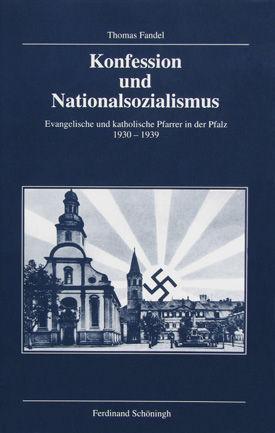Fandel, Thomas: Konfession und Nationalsozialismus. Evangelische und katholische Pfarrer in der Pfalz 1930–1939, Paderborn [u. a.] 1997

As early as the Weimar period, the responses of clergy in the Palatinate to National Socialism evinced clear differences along confessional lines. Whereas Catholic priests combatted National Socialism on the basis of an irreconcilable world-view, a part of the Protestant clergy put great hopes in the »national movement,« not least because many expected it to break the power of political Catholicism.
The contrasting situations in which the two large churches in the Palatinate found themselves shaped their recognizably different responses to Nazism, especially in the early years of the Third Reich. The Protestant Church in the province demonstrated accordance with the new regime. In 1934, an NSDAP »old fighter,« Ludwig Diehl, became bishop for the province. In the Catholic sphere, by contrast, priests and National Socialist functionaries engaged in fierce conflicts, especially at the local parish level. As early as summer 1933, numerous Catholic priests were arrested or forced to leave their parishes.
Thomas Fandel’s study verifies that confessional prejudices prevented cooperation between Protestant and Catholic clergy in the struggle against National Socialism, even in later years, when any illusions about the true nature of the Third Reich had evaporated. Considerable differences of opinion over what constituted proper relations to the NSDAP existed even within the churches. Some Catholic priests, for example, desired a more assertive stance than the Bishop of Speyer considered appropriate. And among the 100 Protestant theologians who joined the Nazi Party, positions ranged from (pro-Nazi) political activism to uncompromising advocacy of the (anti-Nazi) Confessing Church.
This study impresses through the density, and thorough utilization, of its source material. It makes an important contribution to the history of relations between the Christian confessions and National Socialism.
To order our publications, please, contact your local bookshop or the publishing house Schöningh in Paderborn.
